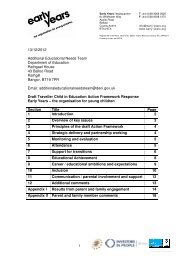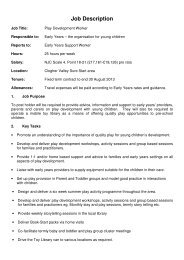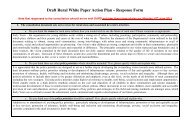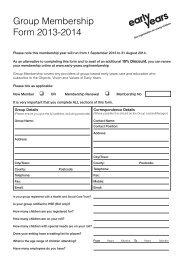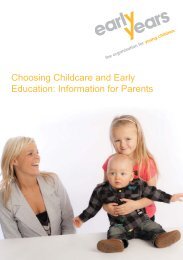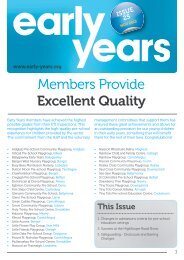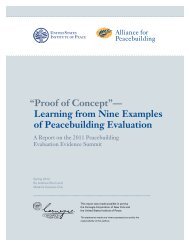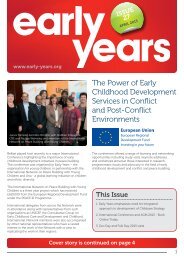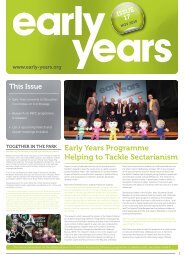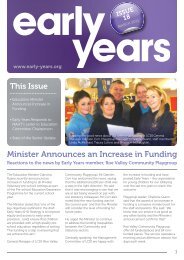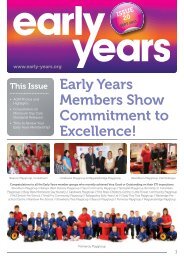Maths through Play - Early Years
Maths through Play - Early Years
Maths through Play - Early Years
You also want an ePaper? Increase the reach of your titles
YUMPU automatically turns print PDFs into web optimized ePapers that Google loves.
<strong>Maths</strong> <strong>through</strong> <strong>Play</strong><br />
<strong>Play</strong> is the natural way in which children learn. It is the process <strong>through</strong> which children explore,<br />
investigate, recreate and come to understand their world. <strong>Play</strong> is an activity in which everything that a<br />
child knows and can do is practised or used to make sense of what is new.<br />
Role of the Adult<br />
The quality of children’s play is greatly infl uenced by the adults around them. Adults can provide<br />
materials and encouragement and open the door to new activities and learning. <strong>Play</strong> cannot be<br />
directed by adults. An adult can support, enhance or extend play, but the moment they interfere or<br />
dictate its progress then it ceases to be play.<br />
<strong>Maths</strong> <strong>through</strong> <strong>Play</strong><br />
To many adults, the words <strong>Maths</strong> and <strong>Play</strong> have absolutely nothing to do with each other. For many<br />
of us, maths was a torture, something we had to do, and something we didn’t understand and<br />
couldn’t do. <strong>Play</strong> on the other hand was something we loved.<br />
Young children are learning maths all the time <strong>through</strong> a wide variety of play experiences. From<br />
the time they are born, babies are surrounded by sense impressions. Shapes in particular are of<br />
immediate importance: babies react instinctively to the arrangement of shapes which make up the<br />
human face.<br />
In the home, in parent and toddler groups, and pre-school settings, children have many opportunities<br />
to enjoy and learn <strong>Maths</strong> <strong>through</strong> <strong>Play</strong>.<br />
“<strong>Play</strong> is an effective vehicle for fostering Mathematical concepts and developing positive attitudes to<br />
mathematics… Adults in the pre-school setting should seek to extend informally the mathematical<br />
experiences the children have already had in their home environment.” (Curricular Guidance for Preschool<br />
Education) (back page)<br />
<strong>Maths</strong> in the Home<br />
<strong>Maths</strong> is everywhere in the home. With the support of parents, children can grasp many mathematical<br />
concepts <strong>through</strong> their play.
Children will begin to:<br />
• know and understand early maths language of measurement, shapes, spaces, positions, early<br />
numbers, order and patterns<br />
• know the sequence of numbers<br />
• begin to understand positional words, e.g. in, on, outside<br />
• show an awareness of time<br />
• be aware of shapes in their environment<br />
• be aware of 1-to-1 correspondence<br />
• acquire new vocabulary<br />
• learn number rhymes and songs, e.g. one, two, buckle my shoe etc.<br />
• be aware of conservation<br />
When we say a child “knows her numbers” what we often mean is that she can recite the names<br />
of numbers in ascending order. This is quite useful to be able to do, but it means very little in itself.<br />
Children need to come to know what the number system really means. They can be helped to do this<br />
<strong>through</strong> play.<br />
One of the fi rst things they have to learn is about conservation – that 3 is always 3 no matter how it is<br />
arranged or presented, whether it is the number 3, the letters for three, 3 bricks, 3 buttons on a coat<br />
or 3 Billy Goats Gruff.<br />
Before a child can understand numbers for things that can be seen – 3 miles, 3 years old – s/he<br />
needs real objects which can be seen and handled with a chance to check that the count is right each<br />
time.<br />
Young children have many mathematical experiences in their home environment. For example:<br />
• they learn about money as they go shopping with parents<br />
• become aware of numbers as they count the stairs to bed<br />
• start to understand the concept of time as they become familiar with the routine of their day<br />
– wash, dress, breakfast etc.<br />
A child’s daily life offers many practical opportunities to learn about number, shape, space, sorting<br />
and matching. For instance:<br />
• setting places at the table – a cup for me, a cup for you<br />
• playing with water<br />
• steering the pram<br />
• helping to sort the washing, matching socks, big shirt / small shirt<br />
• tidying up – putting similar items together<br />
• matching lids to saucepans<br />
Here are a few ways in which you can use play to learn mathematical concepts.
Sand and Water<br />
• Using sand can develop mathematical concepts and language, e.g. heavy, light, empty, full,<br />
big, little<br />
• Conservation – how much will it hold<br />
• Make shapes and patterns<br />
• Provide boxes and materials of different shapes and sizes to compare weight and quantity<br />
• Look at the differences between wet and dry as a means of looking at weights<br />
Language<br />
• You can help to promote mathematical language such as – heavy, light, empty, full, long, short,<br />
big, small in relevant contexts<br />
• Look at your home environment to develop language, especially positional words – small object<br />
in front of big object, behind, in, on<br />
Dough<br />
The use of dough can help to develop a mathematical understanding for pre-school children.<br />
• Develops mathematical language – short, long, fat, thin<br />
• Make shapes of different dimensions – fl at shapes, 3-d shapes<br />
• Create opportunities to compare things that fl oat with things that do not<br />
Imaginative <strong>Play</strong><br />
• Simple activities like letting your child set the table for dinner can help develop counting skills,<br />
e.g. getting out three pieces of cutlery.<br />
• Involve your child with household activities. After washing, allow your child to sort clothes into<br />
different colours, or different types of clothes, e.g. t-shirts and socks. This will help to develop a<br />
child’s knowledge of shapes and colours.<br />
Books and Rhymes<br />
Enjoy stories and rhymes with your child that has a mathematical element, e.g. “One-two, Buckle my<br />
Shoe”,<br />
This can also help to develop literacy skills by showing your child that the print reads from left to right.<br />
Let your child count out items in the books – how many animals are on the page, how many items are<br />
blue.<br />
Using rhymes can also help develop your Childs awareness of sequenceing
Physical <strong>Play</strong><br />
• Develop fi ne motor skills <strong>through</strong> physical activity, e.g. Sorting out a jigsaw, Threading beads<br />
• Block play or playing with toy cars can help to develop sequencing by encouraging your child to<br />
sequence according to size, colour, use (e.g. bike, car, lorry)<br />
• <strong>Play</strong>ing with different sized blocks can help to develop an understanding of weight and<br />
dimensions.<br />
• Tidying toys away allows children to sort into different sizes and colours.<br />
• It can also develop mathematical language – fi rst, second, third, how many are blue, which is<br />
largest / smallest.<br />
Nature<br />
By planting seeds you can help to develop your child’s understanding of time and the life cycle of<br />
plants.<br />
Watch as the plants grow and even measure your plant – develop language such as taller.<br />
Teach your child about the different seasons and plant different items at different times of the year to<br />
compare colours, fl owers, smells.<br />
There are many opportunities for learning <strong>Maths</strong> <strong>through</strong> <strong>Play</strong>. For more ideas on Learning <strong>through</strong><br />
<strong>Play</strong>, get a copy of “I Want To <strong>Play</strong>”, a publication full of practical ideas to use at home with young<br />
children, available at <strong>Early</strong> <strong>Years</strong>, 6c Wildfl ower Way, Apollo Road, Belfast, BT12 6TA, Tel: 028 9066<br />
2825.



